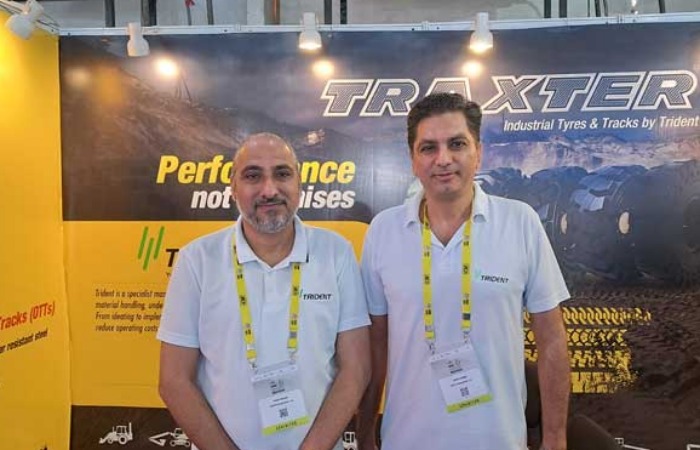
Soon there will be a trend of electrification in CE
Trident was founded in 1997, and its primary business has always been off-the-road tyres. Within this segment, we specialise in industrial tyres for mining equipment, material handling equipment, infrastructure equipment, and construction equipment.
What are the companys offerings for the mining segment?
Within the mining sector, our focus is on underground mining”i.e. tyres for LHDs, jumbo drills, shuttle cars, etc. As you may be aware, operating conditions in underground mining are quite different from surface mining, this includes working in tight spaces, and very severe underfoot terrain, besides operating in underground mines there are many more safety concerns. If a tyre fails prematurely in an underground mine, whether due to service damage or manufacturing-related problems, it presents many difficulties. We developed solutions for the underground mining industry to specifically address these challenges.
What are the USPs of these products?
Our value proposition is to provide a customer with a product that enhances safety, decreases downtime, and increases productivity. We concentrate on offering solutions that render tyres puncture-proof. We offer two technologies: i.e. tyre filling with polyurethane also known as foam filling and full rubber tyres, often known as solid tyres.
Tyres made entirely of rubber cannot puncture. The benefit is that solid tyres last longer due to the extra deep tread. In tyre filling, polyurethane is injected into an existing tyre. In tyre filling, you take an existing pneumatic tyre and replace the air with polyurethane. You are thus converting a pneumatic tyre into a solid.
Depending upon the specific operating conditions, there are some applications in which solid tyres are better suited whereas in some other applications in which foam-filled tyres will work better. We try to engage with the customer and understand what their specific issues and pain points are and then offer a solution.
The availability of raw materials is one of the key issues faced by most tyre manufacturers. What are the challenges faced by your company?
Yes. The supply chain had problems, but many of these have been mostly addressed. Fr our export business, there were some delays on account of poor availability of shipping containers.
However, for our domestic customers, weve always maintained a large inventory for quick turnarounds. We didnt have any instances of our customers waiting for tyres due to non-availability. We endeavour to supply on demand, even if this means that we have to overstock. This has been our strategy right from the beginning and across all capabilities.
For instance, the raw materials needed for the foam filling process and even the machinery needed is imported. Today we have four filling stations. We started with one, but we deliberately built a certain amount of redundancy in the system. These stations or production units are like a complete setup to fill tyres.
Given our long association with our clients, we know the machines they have, the tyres they need & typical service life. As Foam filling is a lengthy process that takes time to complete, we dont wait for clients to place orders but produce for stock based on customer ordering patterns.
In Pune, we have a fully functional modern workshop with multiple tyre mounting machines, handling equipment and tyre-changing tools. Some of the machines have been developed internally.
How important is R&D for the company?
In underground mining especially, R&D plays a very important role. As machines are getting bigger, faster and more expensive. This puts a lot of pressure on the capital structure of any business. Recently, new regulations mandated the engines to be Bharat VI compliant. In terms of the actual output, there is almost no improvement, but this increased the cost of machines by 15 to 20 per cent.
It is more important than ever to make sure that your machines are as productive as they can be. You really dont want idle expensive machines because the tyres are not performing or getting damaged or punctured frequently.
Sooner there will also be a trend of electrification in construction equipment. We are already seeing this trend in Europe. Even this will have an impact on the tyre. The requirements of rolling resistance, the requirements of higher torque, etc. are going to affect the performance of the tyre.
Do you export? Which are your stronger markets?
About 80 per cent of our sales are exported. There is a very clear trend to make supply chains more resilient. Even if customers have not faced any major issues in terms of the supplies from China, they are increasingly wanting to develop an alternative. We are seeing a lot of customers inquire and almost actively seeking alternatives to their current supply sources from China.
In terms of performance, how was the year 2022 for the company? What is your plan for 2023?
In FY22, we were almost at the pre-COVID level. FY23 is shaping up to be our best year ever. We are expanding our facilities in Jejuri, Pune. We are adding substantial capacity over there and well be developing a lot of new products. Some of the products, which are currently not made in India, will also be made. We expect that plant to be operational soon.


 +91-22-24193000
+91-22-24193000 Subscriber@ASAPPinfoGlobal.com
Subscriber@ASAPPinfoGlobal.com